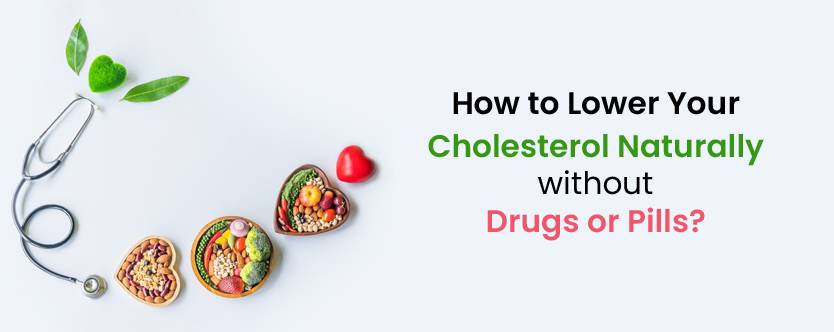7 Ways to Lower Your Cholesterol Naturally Without Medication
Cholesterol management is a critical part of maintaining overall health, especially for preventing heart disease and stroke. While medication can be effective, many people can significantly improve their cholesterol levels by making simple lifestyle changes. Here are seven proven methods to lower your cholesterol naturally.
1. Adopt a Heart-Healthy Diet
Your diet plays a central role in managing cholesterol. Including the right foods and avoiding harmful ones can have a significant impact.
- Increase Soluble Fiber: Foods like oats, barley, legumes, apples, and pears are rich in soluble fiber, which binds to cholesterol in your digestive system and helps remove it from your body.
- Prioritize Healthy Fats: Replace saturated and trans fats with unsaturated fats. Use olive oil, eat avocados, and add nuts like almonds and walnuts to your diet.
- Limit Processed Foods: Processed snacks, fried foods, and baked goods often contain trans fats, which increase LDL cholesterol while lowering HDL cholesterol.
- Include Plant Sterols and Stanols: Found in fortified foods like certain margarines and orange juices, these compounds block cholesterol absorption.
Pro Tip: Start your day with a bowl of oatmeal topped with fresh fruit and chia seeds to kickstart your cholesterol-lowering diet.
2. Get Moving: Increase Physical Activity
Regular exercise not only strengthens your heart but also directly affects your cholesterol levels.
- How It Works: Aerobic exercises like walking, running, and swimming increase HDL (good cholesterol) while lowering LDL (bad cholesterol).
- Recommended Duration: Aim for at least 150 minutes of moderate exercise per week, such as brisk walking or cycling.
- Incorporate Strength Training: Building muscle mass through weightlifting or bodyweight exercises enhances your metabolism and overall cholesterol management.
Pro Tip: Short on time? Even 10-minute bursts of activity, such as climbing stairs or a quick jog, can add up to make a difference.
3. Achieve and Maintain a Healthy Weight
Excess weight, especially around the midsection, contributes to higher LDL levels and lower HDL levels.
- How Weight Loss Helps: Losing even 5–10% of your body weight can have a noticeable impact on your cholesterol levels.
- Strategies: Practice portion control, avoid sugary drinks, and incorporate whole foods into your meals.
- Track Your Progress: Use a food diary or apps like MyFitnessPal to monitor your diet and exercise habits.
Pro Tip: Replace one unhealthy habit at a time, such as swapping chips for carrots and hummus. Small steps lead to sustainable changes.
4. Opt for Omega-3-Rich Foods
Omega-3 fatty acids are renowned for their heart-health benefits.
Sources:
- Fatty fish (salmon, mackerel, sardines), flaxseeds, chia seeds, and walnuts are excellent options.
How It Helps:
- Omega-3s lower triglycerides, a type of fat in your blood, and improve HDL cholesterol levels.
Supplements:
- Fish oil capsules can be a convenient alternative, but consult a doctor for the right dosage.
Pro Tip: Aim to eat fatty fish at least twice a week. Try baking salmon with a sprinkle of herbs for a quick, nutritious meal.
5. Cut Back on Sugar and Refined Carbs
Excessive consumption of sugar and refined carbohydrates like white bread and pastries can lead to higher triglyceride levels.
- Healthier Alternatives: Swap white rice for brown rice or quinoa, and opt for whole-grain bread instead of white.
- Benefits: Reducing sugar intake stabilizes blood sugar levels and prevents LDL cholesterol spikes.
Pro Tip: Read food labels carefully to spot hidden sugars in sauces, snacks, and beverages.
6. Reduce Alcohol Consumption and Avoid Smoking
Both smoking and excessive alcohol consumption negatively affect cholesterol levels and heart health.
- Alcohol Guidelines: Limit yourself to one drink per day if you're a woman and two drinks per day if you're a man.
- Quit Smoking: Within weeks of quitting, HDL cholesterol begins to improve, and your risk of heart disease declines significantly.
- Support for Quitting: Look into smoking cessation programs, counseling, or nicotine replacement therapies for assistance.
Pro Tip: Replace drinking or smoking with healthier habits like sipping herbal tea or engaging in relaxing activities like yoga.
7. Stay Hydrated and Include Natural Supplements
Hydration and certain natural supplements can also support cholesterol health.
- Hydration: Drinking plenty of water aids digestion and helps the body eliminate toxins, including excess cholesterol.
- Supplements: Consider natural cholesterol-lowering supplements like red yeast rice or psyllium husk, but consult your healthcare provider first.
Pro Tip: Add lemon or cucumber to your water for flavor while reaping added antioxidants.
Managing cholesterol naturally is about making consistent lifestyle choices. By adopting a heart-healthy diet, staying active, maintaining a healthy weight, and reducing harmful habits, you can take control of your health without relying on medication.
Start small by incorporating one or two of these tips into your daily routine and gradually build from there. Remember, each step brings you closer to a healthier, more vibrant life. Take charge of your cholesterol today—your heart will thank you!


